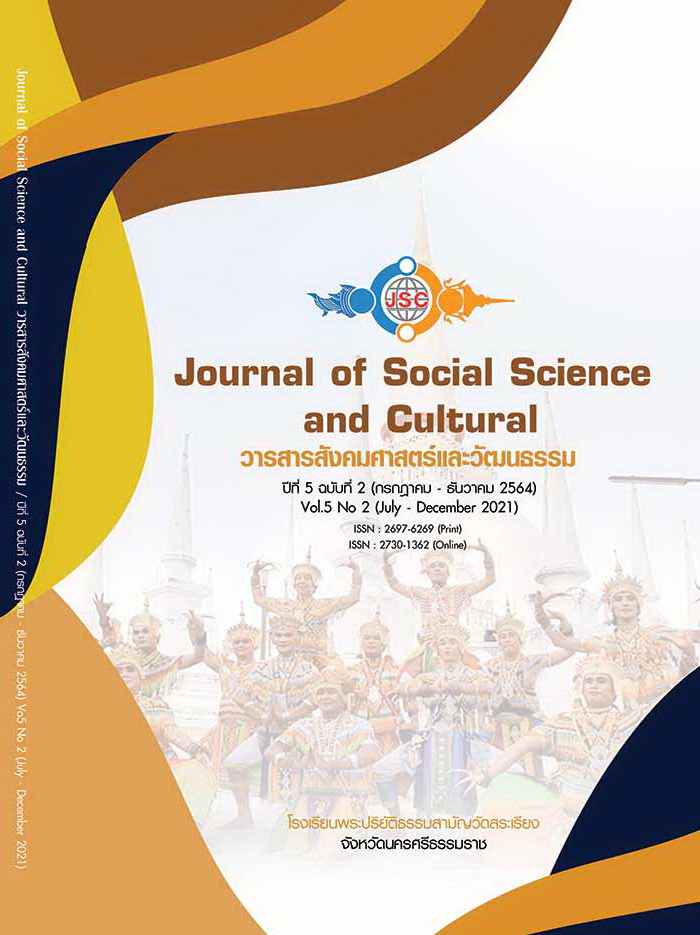APPLICATION OF KING's PHILOSOPHY TO EMPOWER COMMUNITY WELL-BEING
Main Article Content
Abstract
The objectives of the research article were to 1) study the context and community well-being situation of case studies from 4 regions of Thailand, and 2) study the application of King's philosophy to empower community well-being. This was qualitative research that studies data from documents, in-depth interviews, group discussions, participant observations. The key informants were community leaders who played a role in promoting community well-being, selected purposive sampling from representatives of model communities from representatives of 4 regions, namely 1) Northern region, 2) Northeastern region, 3) Central region, and 4) Southern region, 10 persons from each region, totaling 40 persons. By content analysis data, extracting lessons, and summarized overall. The study was found that: 1) the context and community well-being situation of case studies from 4 regions of Thailand include 1) The model community has social and cultural costs, have history, have tradition and culture that is a pattern of life as an identity, have lifestyle that is in harmony with the society and culture of each community, have community management in the form of "houses, temples, schools" as guidelines for community development leading to good community well-being, 2) population, occupation and income, most of them have income from agriculture. and general contracting, and 3) leadership groups and social relationships. Leaders play a role in driving promotion community well-being and can coordinate cooperation both within and outside the community. And 2) The application of King's philosophy to empower community well-being has 4 level of application such as 1) understanding, 2) accessing, 3) developing and 4) upgrading by the main goal was coexistence of kinship society and the happiness of the community, and created the most complete self-reliant balance path.
Article Details
References
คณะกรรมาธิการขับเคลื่อนการปฏิรูปประเทศด้านเศรษฐกิจ. (2559). รายงานเรื่องการปฏิรูปเศรษฐกิจเชิงสร้างสรรค์และเชิงวัฒนธรรม (Creative and Cultural Economy). กรุงเทพมหานคร: สำนักงานเลขาธิการสภาขับเคลื่อนปฏิรูปประเทศ.
ชาย โพธิสิตา. (2550). ศาสตร์และศิลป์แห่งการวิจัยเชิงคุณภาพ. กรุงเทพมหานคร: บริษัทอมรินทร์พริ้นติ้งแอนด์พับลิชชิ่ง จำกัด (มหาชน).
ถนัด ใบยาและวิชัย นิลคง. (2563). การพัฒนาชุมชนจัดการสุขภาวะแบบมีส่วนร่วมตามหลักปรัชญาเศรษฐกิจพอเพียง จังหวัดน่าน. วารสารวิชาการกรมสนับสนุนบริการสุขภาพ, 16(2), 25-36.
ธีรวัฒน์ ชนะภัย. (2559). แนวทางการเสริมพลังชุมชนในโครงการจัดการทรัพยากรธรรมชาติชุมชนแม่ละอูป ภายใต้มูลนิธิรักษ์ไทย จังหวัดเชียงใหม่. ใน วิทยานิพนธ์พัฒนาชุมชนมหาบัณฑิต สาขาวิชาการพัฒนาชุมชน. มหาวิทยาลัยธรรมศาสตร์.
แนวหน้า. (2564). โลกสดใส กายสุขสันต์. เรียกใช้เมื่อ 14 ธันวาคม 2564 จาก https://www.naewna.com/local/columnist/39735
บุญชม ศรีสะอาด. (2556). วิธีการทางสถิติสำหรับการวิจัย เล่ม 2. กรุงเทพมหานคร: สุวีริยาการพิมพ์.
ผู้นำชุมชนภาคตะวันออกเฉียงเหนือท่านที่ 1. (10 เมษายน 2564). การประยุกต์ใช้ศาสตร์พระราชาเพื่อเสริมพลังอำนาจสุขภาวะชุมชน. (เริงวิชญ์ นิลโคตร, ผู้สัมภาษณ์)
ผู้นำชุมชนภาคใต้ท่านที่ 1. (9 เมษายน 2564). การประยุกต์ใช้ศาสตร์พระราชาเพื่อเสริมพลังอำนาจสุขภาวะชุมชน. (เริงวิชญ์ นิลโคตร, ผู้สัมภาษณ์)
ผู้นำชุมชนภาคเหนือท่านที่ 1. (10 พฤษภาคม 2564). การประยุกต์ใช้ศาสตร์พระราชาเพื่อเสริมพลังอำนาจสุขภาวะชุมชน. (เริงวิชญ์ นิลโคตร, ผู้สัมภาษณ์)
มณี อาภานันทิกุล. (2561). สุขภาพพอเพียง. วารสารสภาการพยาบาล, 33(2), 5-14.
วุฒิชัย สายบุญจวง. (2561). ชุมชนเข้มแข็งในทัศนะของชาวชุมชน กรณีศึกษา บ้านปลายคลองบางโพธิ์เหนือ หมู่ที่ 3 ตำบลบางโพธิ์เหนือ อำเภอสามโคก จังหวัดปทุมธานี. วารสารวไลยอลงกรณ์ปริทัศน์ (มนุษยศาสตร์และสังคมศาสตร์), 8(1), 119-129.
สภานิติบัญญัติแห่งชาติ. (2560). ศาสตร์ของพระราชา: ผู้นําโลกในการพัฒนาอย่างยั่งยืน รวมกฎหมายสนับสนุนโครงการอันเนื่องมาจากพระราชดําริ ในพระบาทสมเด็จพระปรมินทรมหาภูมิพลอดุลยเดช บรมนาถบพิตร. กรุงเทพมหานคร: คณะกรรมการโครงการเฉลิมพระเกียรติของสภานิติบัญญัติแห่งชาติ รวบรวมกฎหมายที่สนับสนุนในโครงการอันเนื่องมาจากพระราชดำริ สภานิติบัญญัติแห่งชาติ.
สมาชิกชุมชนภาคกลางท่านที่ 1. (28 พฤศจิกายน 2563). การประยุกต์ใช้ศาสตร์พระราชาเพื่อเสริมพลังอำนาจสุขภาวะชุมชน. (เริงวิชญ์ นิลโคตร, ผู้สัมภาษณ์)
สมาชิกชุมชนภาคเหนือท่านที่ 1. (10 พฤษภาคม 2564). การประยุกต์ใช้ศาสตร์พระราชาเพื่อเสริมพลังอำนาจสุขภาวะชุมชน. (เริงวิชญ์ นิลโคตร, ผู้สัมภาษณ์)
สำนักงานสภาพัฒนาการเศรษฐกิจและสังคมแห่งชาติ. (2564). “สภาพัฒน์” จัดประชุมประจำปี 2563 "ชีวิตวิถีใหม่ ประเทศไทยหลังโควิด”เผยผลการพัฒนาครึ่งแผนฯ 12 พร้อมรับมือวิกฤตและชีวิตวิถีใหม่. เรียกใช้เมื่อ 14 กันยายน 2564 จาก https://gnews. apps.go.th/news?news=69332
สุวิทย์ เมษินทรีย์. (2563). โลกเปลี่ยน คนปรับ หลุดกับดัก ขยับสู่ความยั่งยืน. กรุงเทพมหานคร: กระทรวงการอุดมศึกษา วิทยาศาสตร์ วิจัยและนวัตกรรม.


